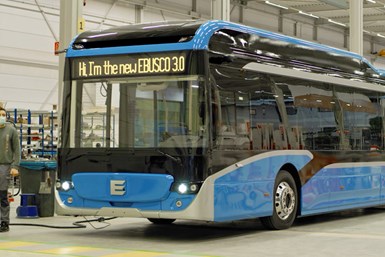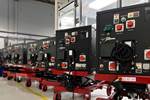Ebusco leases Renault Cléon production site, fuels future electric bus capacity
New 21,000-square-meter French headquarters and production facility will facilitate production of 500 composite buses/year starting in 2024 with room for later growth.
Share

Ebusco 3.0 electric city bus. Photo Credit: Ebusco
Bus and coach company Ebusco (Deurne, Netherlands) has elected the Renault Cléon site to set up its French headquarters and production facility for the Ebusco 3.0 electric city bus — composite components that support the large rear window and enable access to the bus’ electrical system are developed by Telene SAS (Bondues, France) and the composite body-in-white (BIW) by Pondus Operations (Deurne, Netherlands). Ebusco says it will contribute to the 21,000-square-meter Cléon site — which became available after a strategic shift to a 100% electric vehicles ecosystem — through its public transport electrification experience, and knowledge in lightweight materials integration.
The new Ebusco factory is expected to be fully operational by the end of 2023 and will have an initial capacity of 500 buses per year with the option to expand capacity in later years. The initial investment to equip the facility and convert it to Ebusco standards is expected to be €10 million.
“After the establishment of a development team in France two years ago, the installation of a second production site in Europe, as well as a new headquarters for our French subsidiary, is an important step for Ebusco in its development in France and southern Europe,” Peter Bijvelds, CEO of Ebusco, says. He notes that France represents the largest bus fleet in Europe. With its new local production facility, Ebusco aims to enhance its service to existing French clients and gain further traction with new French mobility authorities.
Related Content
-
BMW Group to bring iX5 Hydrogen pilot fleet into service in 2023
A fleet of under 100 vehicles, featuring BMW fuel cell technology and 700-bar CFRP storage tanks, will be deployed for international demonstration and trial purposes.
-
Bcomp ampliTex makes appearance in Cupra EV Cup Bucket seats
The entire Cupra Born VZ line-up features all-natural fiber front seats that highlight functionality, aesthetics and reduced CO2 emissions.
-
Envalior offers novel Tepex composite for EV battery housings
Low-thickness, recyclable thermoplastic composite passes strict thermal runaway tests for EV battery housings.












